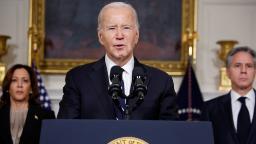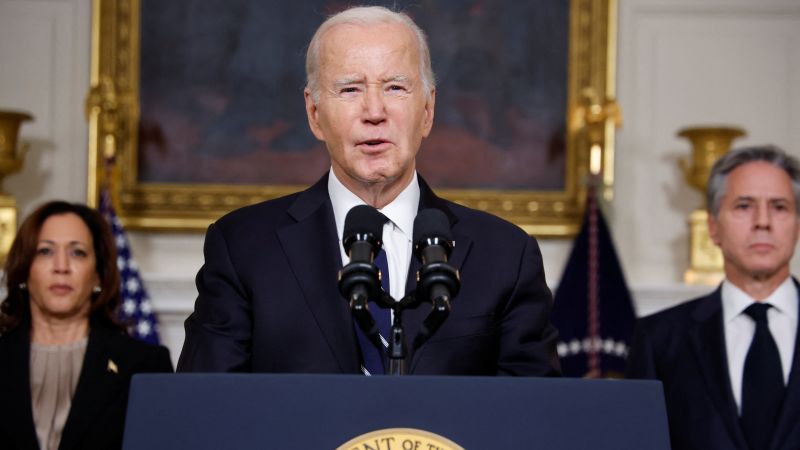
CNN
—
When President Joe Biden gathered with his top advisers Tuesday morning to go over the draft of his speech on Israel, he made a clear request: The prepared remarks needed to include more details on the appalling nature of the attacks that began four days earlier.
The American people must understand just how shocking and gruesome Hamas’ actions were, Biden told his aides. Later that day, speaking from the State Dining Room of the White House, Biden would describe parents butchered as they tried to protect their children, babies murdered, and women raped and assaulted.
“This,” Biden said, “was an act of sheer evil.”
Biden’s deep, emotional reaction to the attack has translated into a forceful American response, including ordering US warships and planes into the region, ratcheting up intelligence sharing and making little attempt at encouraging restraint in Israel’s reprisals.
Going forward, however, the president will face a delicate balance as he works to support America’s ally while also avoiding becoming embroiled in another foreign conflict. It all is reflective of a complicated dilemma for the president, who now faces wars in Europe and the Middle East at the same time he is ramping up a campaign for reelection premised largely on his experience as a stable, competent leader.
In closed-door briefings and conversations with his team, Biden has emphasized the importance of getting the response right – and the dire consequences should the US miscalculate or misstep.
“I just think that if we stay true to our values, pursue with every inch and every bit of our energy to get this right, we can bury this again and bring people back, bring people home. I think we can change the Middle East,” Biden told a group of Jewish American leaders on Wednesday. “But then again, I have been referred to as a congenital optimist.”
So far, the balance has been playing out both in public and private.
In his conversations with Israel Prime Minister Benjamin Netanyahu, Biden has reiterated he understands the necessity of an overwhelming retaliation, but he has also raised the importance of adhering to the rules of war and sparing the lives of civilians.
And even as American officials have openly acknowledged Iran’s role in supporting Hamas over the years, they are wary of the reality that should a direct link between Tehran and the weekend’s rampage be drawn, there is a greater risk of being dragged into a wider regional conflict.
Even amid a dire hostage crisis, the US has maintained that it has no intention, at present, of sending American troops into the fight. But that position could change if the conflict intensifies.
“If tomorrow Hezbollah started launching missiles into Israel, that would be seen as a real escalation,” according to a person close to the situation.
John Kirby, spokesman for the National Security Council, said the US so far has not seen rogue actors skirt its warnings against widening the war but noted that “it’s not the kind of thing that they, you know, phone in.”
And Biden, speaking Wednesday, said his moves so far in the region are meant in part to send a message to the Iranians: “Be careful.”
With the images still coming in of the horrors inflicted upon civilians by Hamas, backing for Israel remains mostly unified within the administration and among American lawmakers.
But administration officials don’t necessarily expect that to last forever, particularly if civilians in Gaza bear the brunt of Israel’s response to the Hamas attacks. Already, electricity and food are in short supply in the blockaded territory.
In his private conversations with Netanyahu, Biden has not urged the Israeli leader to practice restraint in its counterattack against Hamas. When they spoke Tuesday, he told his counterpart that if a terror attack of similar scale occurred in the United States, the response would be “swift, decisive, and overwhelming.”
But the president also discussed with his counterpart his concerns about civilian casualties and the importance of minimizing collateral damage in the coming days.
“It is really important that Israel, in all the anger and frustration – I don’t know how to explain it – that exists, they operate by the rules of war,” Biden told the Jewish leaders Wednesday, adding later that “it’s not about revenge.”
As the world braces for a new war in the Middle East, with the prospect of escalation far beyond Israel and Gaza, Biden’s lifetime of experience and worldview comes into sharper focus. From his first visit to Israel in 1973 – which he recounted in his speech Tuesday – to the Senate Foreign Relations Committee to the vice presidency to the Oval Office, no American president has had a similar breadth of exposure to the Israeli-Palestinian conflict.
It is that unparalleled background, allies say, that will guide Biden’s next steps through remarkably uneven geopolitical crosscurrents of aid for Israel, funding for Ukraine and relations with Iran.
But it is also Biden’s unapologetic decision to withdraw from Afghanistan three years ago – defiantly but chaotically ending America’s longest war – that also serves as a guidepost for him.
“This president knows every side of this,” a senior US official told CNN, “and he will not be pushed into something he is not comfortable with.”
The Biden administration has deployed a number of assets to the region in a show of force and a warning to any hostile parties considering getting involved. A carrier strike force is now stationed in the Mediterranean, and the Defense Department has sent planes from Europe with ammunition and interceptors requested by Netanyahu that landed overnight.
“The landing of American military planes – even without troops on the ground – sends the message of deterrence,” said a senior administration official.
There could be more measures taken in the future. A second senior administration official told CNN that the US wants to “see what effect” the existing actions have before deploying more.
Amid concerns of the US being drawn into a Middle East conflict, a senior Israeli official told CNN’s Matthew Chance that “Israel does not expect the United States to fight for us,” saying that a US aircraft carrier group newly positioned off the Israeli coast would help provide “long-range coverage” in the event of a broader regional conflict.
The White House has remained loathe to commit to a particular role as the situation remains fluid.
“I’m not here to draw red lines or issue warnings or give lectures to anybody,” US national security adviser Jake Sullivan told reporters this week. “I’m here to say the president has given us direction to take a series of actions. We are undertaking those actions and we will continue to do so in the weeks ahead.”
Advisers to the president say the past five days have been a deeply emotional time for him, as he has grappled with the second major outbreak of a war during his presidency and the images and stories of Hamas’ heinous actions have poured in.
“He has always approached Israel with moral clarity and full commitment,” a senior adviser to the president told CNN.
Biden’s four telephone calls with Netanyahu have been tinged with emotion as the extent of the horrors becomes clearer. A person familiar with the conversations said the first, early on Saturday morning, was “raw” as the devastation came to light.
“He can hear the pain in Prime Minister Netanyahu’s voice when he talks to him,” Sullivan said this week. “I hear the pain of my counterparts when I talk to them.”
The calculated approach to Netanyahu will be a central component of Biden’s response to this weekend’s attack. The men have known each other for decades and have relied on that history as they weathered deep strains over the past year related to Netanyahu’s far-right governing coalition.
Biden believes he knows Netanyahu “better than anyone,” one official said, and in the past has carefully applied pressure on the Israeli leader to avoid inflaming or escalating conflicts with the Palestinians.
Yet history may offer far less of a roadmap for Biden on another front, as support for Israel has fallen among some quarters of the Democratic Party, and he enters a yearlong reelection bid with the Middle East suddenly front-and-center in the US presidential campaign.
Rep. Alexandria Ocasio-Cortez, a New York Democrat, called the attack by Hamas “absolutely horrific,” but said in an interview on Wednesday that Congress should have a “nuanced” conversation on the conflict moving forward.
“This is a situation of incredible trauma for Israelis, especially on Saturday, and Palestinians who have been enduring the realities of occupation for decades,” Ocasio-Cortez told CNN. “And I think there needs to be space for us and the ability for us to have that real conversation, that nuanced conversation that sees the humanity of everyone impacted.”

